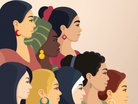USAID Champions Equality and Sustainability in Agriculture

USAID is spearheading a ground-breaking initiative to transform global agricultural supply chains by focusing on gender equality and sustainability.
With a US$50m public-private partnership alongside leading companies like PepsiCo, Unilever, Danone, McCormick & Company and Nespresso, the initiative, Advancing Women for Resilient Agricultural Supply Chains, aims to dismantle barriers faced by women in agriculture while promoting environmental resilience.
The effort aligns with the Women in the Sustainable Economy (WISE) initiative, launched in 2023 under Vice President Kamala Harris, which champions women’s economic security in climate-affected sectors.
By empowering women and prioritising sustainable practices, this initiative envisions a new model for agricultural supply chains that can adapt to modern challenges.
The role of women in sustainable agriculture
Women are pivotal to agriculture worldwide, producing a significant portion of the world’s food.
However, they often face systemic challenges such as limited access to land, financing and market opportunities. These barriers not only harm individual livelihoods but also weaken the overall efficiency and resilience of agricultural supply chains.
The partnership addresses these disparities by scaling proven strategies and expanding the inclusion of women across all levels of the supply chain. Through training, market access and leadership opportunities, the initiative empowers women to become key players in agricultural transformation.
This approach isn’t just about equality—it’s also about productivity.
Studies have shown that closing gender gaps in agriculture can significantly improve food production and environmental outcomes. By tackling inequality, the programme strengthens supply chains to be more adaptive to disruptions such as climate change, pandemics and economic instability.
USAID Administrator Samantha Power emphasises: “Empowering women strengthens economies, communities and ecosystems.”
A holistic approach to supply chain resilience
The initiative kicks off with US$50m in funding, with over US$11m contributed by USAID. It plans to scale to US$90m within five years, with a clear focus on merging gender equity with environmental sustainability.
This dual-purpose strategy is rooted in creating practical solutions that benefit individuals and the planet. By empowering women to lead in agriculture, the initiative demonstrates how inclusive practices can align seamlessly with environmental goals, such as reducing carbon footprints and preserving biodiversity.
The broader impact of this initiative is evident in its potential to serve as a model for inclusive and sustainable supply chains. By prioritising equity, the partnership creates a ripple effect, benefiting industries, communities and ecosystems alike.
Building on the Climate Gender Equity Fund
In parallel, USAID’s Climate Gender Equity Fund complements this initiative by focusing on gender inclusion in climate finance. Supported by partners like Amazon and Reckitt, the fund ensures that women-led organisations can access resources to drive sustainable innovation.
This integrated approach addresses interconnected challenges, from land rights to energy access and strengthens supply chains across diverse industries. To date, the fund has mobilised more than US$681m in commitments, adding to a total investment of US$2bn under the WISE initiative.
Such collaborations highlight the importance of bridging gender and sustainability efforts. Whether through agriculture or climate finance, the inclusion of women creates more efficient, adaptable systems that can better withstand global challenges.
Towards a sustainable future
The long-term vision of this initiative extends far beyond agriculture.
By equipping women with the tools and opportunities they need, supply chains can become stronger and more adaptable to future challenges. From mitigating climate risks to reducing inequalities, the approach aligns with broader goals of sustainability and resilience.
As industries grapple with modern demands, this partnership shows that gender equality is not just a moral imperative—it’s a strategic advantage. By investing in women, USAID and its partners are setting a precedent for inclusive growth that benefits economies, communities and the planet.
Make sure you check out the latest industry news and insights at Scope 3 Magazine and be part of the conversation at our global conference series, Sustainability LIVE and Procurement & Supply Chain LIVE.
Discover all our upcoming events and secure your tickets today. Subscribe to the Scope 3 Magazine newsletter.
Scope 3 Magazine is a BizClik brand.

